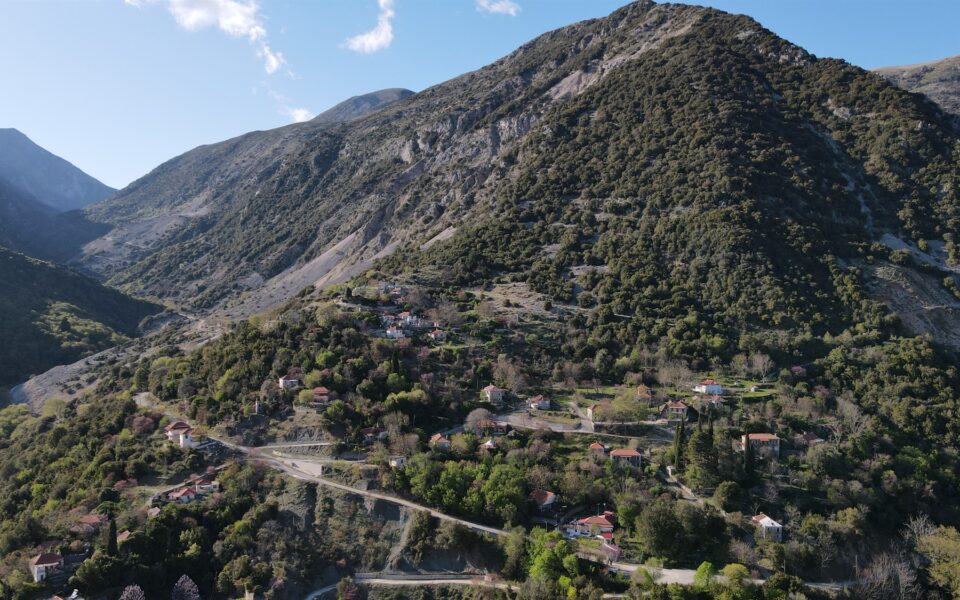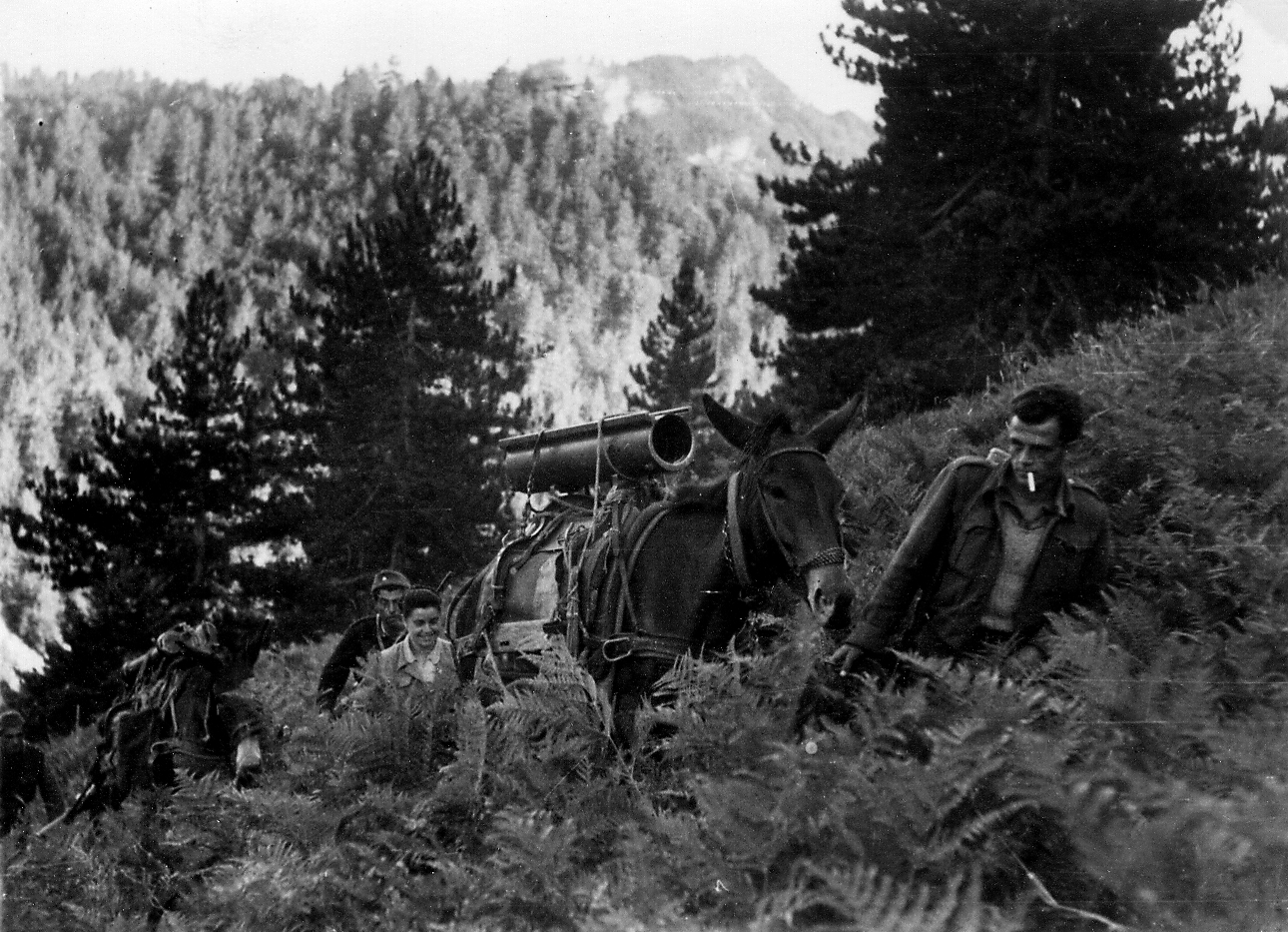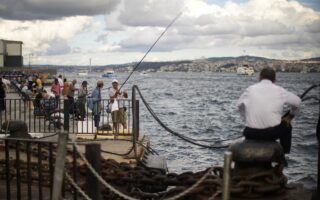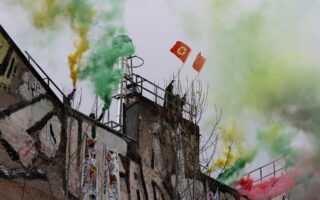A dark chapter of Greek history

I am often asked by American literary friends why modern Greece has produced so many more great poets than prose writers, noting that the country’s two Nobel laureates, Giorgos Seferis and Odysseas Elytis, both wrote poetry rather than fiction. My first response is to point out that Greeks have been writing poetry for 3,000 years but the novel has been in existence for only 300. Besides, I add, modern Greece has produced many great prose writers and I quickly cite Alexandros Papadiamantis, Nikos Kazantzakis, Stratis Myrivilis and Thanasis Valtinos as examples.
From now on, however, I will add to that distinguished list the name of Sotiris Dimitriou. His new book, “Ουρανός απ’ άλλους τόπους,” is a masterwork whose literary value has not been given the attention or the weight it deserves. Part of the reason for that, I suspect, is because he is so successful in rendering the language of the place and time in which his story is set – the villages of the Mourgana mountains in Epirus in the 1940s – that those of us who remember its idioms and cadences marvel at his achievement, but most of today’s readers have to put in some effort to comprehend. But if writing is painting in words then Sotiris Dimitriou has captured peasant life in the Epirus mountains in the middle of the last century in his book as vividly as Pieter Bruegel did peasant life in the Low Countries four centuries earlier in his paintings.
The setting of the tragic story Dimitriou tells is his native village known for centuries as Povla but renamed Ambelonas in recent times. It hugs the border of Albania along the timberline of the Mourgana massif and is about 15 kilometers from my own village, Lia. The men of Povla, like those of Lia, were mostly itinerant tinkers, sometimes absent from home for months at a time. The women were mostly illiterate serfs who did what they were told by their fathers, their husbands and their mothers-in-law. They found comfort only in their children, their religion, and in each other.
Until the middle of the last century, life in Povla, as in all of the 16 villages in the Mourgana range, was as primitive as anywhere in Europe. The village had a priest and a schoolmaster, but no doctor. There were no roads, no electricity, no running water, no amenities. Meat, sugar and coffee were rare luxuries, and daily existence was governed by superstition, fear and suspicion.
The Second World War made things even worse in Povla and the surrounding villages, and the civil war that followed made them unimaginably harsh. Most of the men fled their villages to avoid being forcibly conscripted by the Communist guerrillas who occupied them in the fall of 1947, young women were drafted into the Democratic Army and young children taken to communist countries in the north. Envy, treachery and false witness were added to suspicion and fear.
What happened to those who remained in Povla is vividly recounted in Dimitriou’s book by his mother, Alexo, whose mind and memory remain as clear at 98 as the tintinnabulation of the goat bells she heard throughout her childhood. The focus of her story is her mother Milia, the wife of the president of the village who, like most of Povla’s men, fled as the Democratic Army approached. When the guerrillas couldn’t find the village president, they seized his wife, Milia. “Τις έκλεισαν τις γυναίκες στο κατώι του Λιάγκου. Τους έβαλαν το μασιά πυρωμενον στον γκιοζι και στο στόμα. Μας τα είπε με χρόνια η Χρυσάνθη του Λιάγκου που την είχαν απόλυκουν. Ο, παιδάκια μου, τους έλεγε, έχω έξι κοπέλες παντρεμένες και ανύπαντρες. Και αυτή κοροϊδευαν που έκανε αράδα το σταυρό…Δεν άγλυμονήθηκαν κείνα τα δουλεμένα τα τυραγνισμενα χέρια.”
Milia was hardly the only victim of the guerrillas. As they imposed increasingly draconian measures on the local populations, they felt the need to spread terror throughout the Mourgana villages by finding more and more “subversives” to arrest, torture, denounce in show trials and execute. Most of them were unlettered peasant women whose only subversion was carelessly voicing their opinions about life under the Democratic Army. “Τ’ ήξεραν οι γυναίκες, αγράμματες και ξυπόλυτες και ζόρκες,” asks Alexo.
In early March of 1948 Povla was briefly liberated by the Hellenic Army, but the guerrillas counterattacked and recaptured the village, killing scores of soldiers in the process and taking 177 prisoners, whom they led to their headquarters in Tsamanta, the village above Povla.
It is one of the rare books in which the power of art recreates the full historical truth
In Tsamanta four officers among the prisoners, two of them doctors, were quickly tried and executed. The rest were given a choice: join the guerrilla army or turn in their uniforms for rags and return home. Most of them were mere conscripts whose lives were interrupted by the war and they chose the second option. They were led away from the village, but once out of sight they disappeared, never to be seen again.
Twenty-three years later, in 1971, a shepherd found a partially buried skeleton in a streambed near a lime pit outside of the village. The lime pit gave up 120 skeletons, each with its hands bound with wire and a bullet hole in the skull. They were buried on a hill on the outskirts of Tsamanta but no ministers, no poets, no celebrities ever visit the site to honor their sacrifice the way they do every year at Makronisos to pay respect to those incarcerated there during the civil war. At least the relatives of the soldiers have learned where the remains of their loved ones are buried and can go there to mourn them, but Alexo has no such recourse because the remains of her mother were never found. “Αυτή βγήκαν για να σκοτώσουν τους ίδιους τους έλληνες… Άνθρωποι της καταστροφής.,τι σόι αντάρτικο, τι καθεστώς ήταν αυτό που σκοτώνανε τους Έλληνες.”
When the guerrillas were finally driven out of the Mourgana mountains in September of 1948, they forced all the inhabitants in the villages they occupied to go with them, first to Albania and then to various countries in the Eastern bloc. It would be at least six years before any of them were able to return. “Ξορνιάστηκαν ο κόσμος με τους βρυκολάκους τους αντάρτες. Σκόρπισαν σαν τουφεκισμένα πουλιά. Αυτή δεν ήταν για τίποτα, μονάχα για το κακό,” Alexo laments.
Dimitriou achieves something rare in modern Greek literature in telling his harrowing story. He tells it in the simple regional idiom his characters spoke all their lives and sustains it without ever faltering throughout his narrative. And he does something even more remarkable. He reveals his protagonist, his grandmother Milia, not directly and fully but by the way she is described, discussed and remembered by her fellow villagers, and especially by her daughter, Alexo, the narrator. Nevertheless, he is able to raise Milia to heroic status in the moving way he renders her suffering and her martyrdom.
Despite the powerful story it tells and the brilliant way it is told, “Ουρανός απ’ άλλους τόπους” has not received the attention the author’s previous books garnered even though it is indisputably his best work. And while those who reviewed it have praised the literary quality of the book, one critic comparing the writing to Homer and Papadiamantis, they have not gone into detail on what the book is about, as I have here.
The reason for both omissions is obvious. There is a cultural mania in Greece to cast the violent events of the civil war, particularly the brutality of the Communists in the areas they controlled, into a well of forgetfulness. But as I watch the convulsions in American society today in reaction to past violence against blacks and Native Americans, I wonder if it is healthy for Greeks to try to overlook the brutality inflicted on innocent civilians during the civil war. I think not. Certainly enough time has elapsed to relegate the Greek Civil War to history but not to paper over that history by ignoring the brutality of the guerrillas or the excesses of the government then in power for that matter. It is important to remember the harsh conditions endured by those sent to the internment camps on Makronisos, but it is equally important not to forget the massacre of the 120 soldiers in Tsamanta, young boys barely out of their teens, or the hapless women like Milia and my mother, Eleni Haidis Gatzoyiannis, executed in every village occupied by the Democratic Army. Sotiris Dimitriou is to be congratulated not only for writing brilliantly about a dark chapter in modern Greek history, but for writing about it honestly and fearlessly. The appraisal that British historian C.M. Woodhouse once made in a review of my book, “Eleni,” applies equally to Sotiris Dimitriou’s “Ουρανός απ’ άλλους τόπους.” It is one of the rare books in which the power of art recreates the full historical truth.
Nicholas Gage (born Nikolaos Gatzoyiannis) is a Greek-born American author and investigative journalist.





